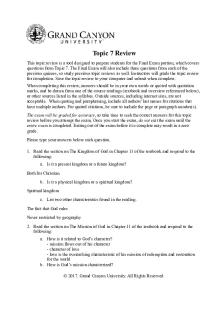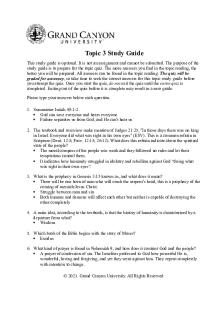CWV 101 RS T1Review Online PDF

| Title | CWV 101 RS T1Review Online |
|---|---|
| Author | Anonymous User |
| Course | Christian Worldview |
| Institution | Grand Canyon University |
| Pages | 4 |
| File Size | 160.6 KB |
| File Type | |
| Total Downloads | 10 |
| Total Views | 149 |
Summary
Download CWV 101 RS T1Review Online PDF
Description
Topic 1 Review This topic review is a tool designed to prepare students for the Topic 1 Quiz. Instructors will grade the topic review for completion. Save the topic review to your computer and submit when complete. When completing this review, answers should be in your own words or quoted with quotation marks, and be drawn from one of the course readings (textbook and lecture referenced below), or other sources listed in the syllabus. Outside sources, including internet sites, are not acceptable. When quoting and paraphrasing, include all authors' last names for citations that have multiple authors. For quoted citations, be sure to include the page or paragraph number(s). The quiz will be graded for accuracy, so take time to seek the correct answers for this topic review before you attempt the quiz. Once you start the quiz, do not exit the quiz until the entire quiz is completed. Exiting out of the quiz before it is complete may result in a zero grade. Please type your answers below each question. 1. List three analogies for worldview used in Chapter 1 of the textbook. Foundation of a Building Lenses Box Top of a Jigsaw Puzzle 2. List the various definitions and descriptions of worldview found in the textbook and lecture. Nash defines worldview as, “conceptual framework, pattern or arrangement of a person’s beliefs. (Directly from the text) Samples definition says, “how one sees life and the world at large. (Directly from the text) While Sire’s expressed worldview to be a commitment to assumptions based on truth or falsehood that form reality and provide the foundation of our understanding. Worldview- a foundational set of assumptions of which form individual and group behavior. Assumptions (Underlying beliefs) Convictions Private Worldview: individual view shaped by personal experiences and relationships. Shared Worldview: assumptions that groups share. Worldview: © 2017. Grand Canyon University. All Rights Reserved.
3. Match the following worldview terms (Atheism, Pantheism, Theism, and Deism) with the correct description below. a. Belief in a personal and relational God who created and sustains all that exists: Theism b. Belief in a God who created all things but is not relational or involved in the world: Deism c. Belief that “all is god” and in a strong sense of spiritualism but not in a personal God: Pantheism d. Belief based only on the natural or physical realm with no spiritual or supernatural: Atheism 4. According to Chapter 1 in the textbook and Lecture 1, which worldview families use both faith and reason? Theism 5. What kind of person does James 1:26 speak about? James spoke about a person whose religious practices are hypocritical 6. Summarize Proverbs 8:10-11. Enlightenment is worth more than riches. 7. What is the difference between private and shared worldviews? When thinking about the differences between private and shared worldviews, the difference is 1 individual and their beliefs versus shared as a community and their groups understanding.
8. Briefly describe the three worldview tests. Practical- determines worldview “livability” Coherence- compares values and beliefs for contradiction. Correspondence- Evaluates worldviews to determine if they are based on reality.
9. Match the following worldview elements (Ultimate Reality, Nature of the Universe, Human Nature, Knowledge, Ethics, and Purpose) with the correct question below: a. Is there absolute truth? Knowledge b. Is there a God? Ultimate Reality 2
c. How do we know right from wrong? Ethics d. Is there a spiritual part to the universe? Nature of the Universe e. Does life have meaning? Purpose f. Are humans merely higher orders of mammals? Human nature
10. When discussing worldviews, what is the difference between an open system and a closed system? Open system differs from closed in that open systems are dynamic, while closed systems are static. Open systems are influenced by spirituality while closed systems are based solely on the material universe.
3
References Hiles, J. S., & Smith, A. F. (2015). Evaluating wisely. In Grand Canyon University (Ed.), The beginning of wisdom: An introduction to Christian thought and life (2nd ed.). Available from http://gcumedia.com/digital-resources/grand-canyon-university/2015/the-beginningof-wisdom_an-introduction-to-christian-thought-and-life_ebook_2e.php Lecture 1. (2017). CWV-101: Christian Worldview. Phoenix, AZ: Grand Canyon University. Waddell, J. (2015). Seeking wisdom. In Grand Canyon University (Ed.), The beginning of wisdom: An introduction to Christian thought and life (2nd ed.). Available from http://gcumedia.com/digital-resources/grand-canyon-university/2015/the-beginning-ofwisdom_an-introduction-to-christian-thought-and-life_ebook_2e.php
© 2017. Grand Canyon University. All Rights Reserved....
Similar Free PDFs

CWV 101 RS T1Review Online
- 4 Pages

CWV 101 RS T1Review Online
- 4 Pages

CWV-101-RS-T1Review-Online
- 3 Pages

CWV 101 RS T6Review Online
- 4 Pages

CWV 101 RS T7Review Online
- 3 Pages

CWV 101 RS T3Review Online
- 4 Pages

CWV 101 RS T7Review Online
- 4 Pages

CWV-101-RS-T2Review-Online
- 4 Pages

CWV 101 RS T2Review Online
- 4 Pages

CWV 101 RS T2Review Online
- 4 Pages

CWV 101 RS T5Review Online
- 3 Pages

CWV 101 RS T7Review Online
- 4 Pages

CWV 101 RS T6Review Online
- 4 Pages

CWV 101 RS T7 Review Online
- 4 Pages
Popular Institutions
- Tinajero National High School - Annex
- Politeknik Caltex Riau
- Yokohama City University
- SGT University
- University of Al-Qadisiyah
- Divine Word College of Vigan
- Techniek College Rotterdam
- Universidade de Santiago
- Universiti Teknologi MARA Cawangan Johor Kampus Pasir Gudang
- Poltekkes Kemenkes Yogyakarta
- Baguio City National High School
- Colegio san marcos
- preparatoria uno
- Centro de Bachillerato Tecnológico Industrial y de Servicios No. 107
- Dalian Maritime University
- Quang Trung Secondary School
- Colegio Tecnológico en Informática
- Corporación Regional de Educación Superior
- Grupo CEDVA
- Dar Al Uloom University
- Centro de Estudios Preuniversitarios de la Universidad Nacional de Ingeniería
- 上智大学
- Aakash International School, Nuna Majara
- San Felipe Neri Catholic School
- Kang Chiao International School - New Taipei City
- Misamis Occidental National High School
- Institución Educativa Escuela Normal Juan Ladrilleros
- Kolehiyo ng Pantukan
- Batanes State College
- Instituto Continental
- Sekolah Menengah Kejuruan Kesehatan Kaltara (Tarakan)
- Colegio de La Inmaculada Concepcion - Cebu

